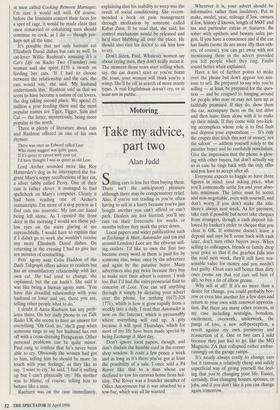Motoring
Take my advice, part two
Alan Judd
Selling cars is less fun than buying them. There isn't the anticipatory pleasure although there may be compensatory relief. Also, if you're not trading in you're often having to sell in a hurry because you've just bought another you can't afford or can't park. Dealers are less hurried; you'll see cars on their forecourts for weeks or months before they mark the price down. Local papers and wider publications such as Exchange & Mart, Autotrader and (in and around London) Loot are the obvious sell- ing outlets. I'd like to own the first two because every word in them is paid for by someone else, twice: once by the advertiser and again by the putative buyer. Many advertisers also pay twice because they buy to make sure their advert is correct. I wish too that I'd had the entrepreneurial flair to conceive of Loot. You can sell anything through it simply by dictating your advert over the phone, for nothing (0171-328 1771), which is how it grew rapidly from a weekly into a daily. I read that Autotrader is now on the Internet, which is presumably where everything will end up. A pity because it will spoil Thursdays, which for most of my life have been made special by being Exchange & Mart day.
Don't ignore local papers, though, and don't disdain the humble card in the corner shop window. It costs a few pence a week and as long as it's there you've got at least the possibility of a sale. I once sold a P4 Rover like that to a man whose car declined to tow his caravan home from hol- iday. The Rover was a founder member of Oilics Anonymous but it was attached to a tow-bar, which was all he wanted. Wherever it is, your advert should be informative rather than laudatory. Put in make, model, year, mileage if low, owners if few, history if known, length of MOT and tax and particular extras or features. Be sober with epithets and beware sales jar- gon. If you have a conscience and if the car has faults (some ifs are more iffy than oth- ers, of course), you can get away with not mentioning them in the advert provided you tell people when they ring. Faults sound better when explained.
Have a list of further points to make over the phone but don't appear too anx- ious to sell. Be prepared to say why you're selling — at least, be prepared for the ques- tion — and be resigned to hanging around for people who may or may not turn up as faithfully promised. If they do, show them the car, accompany them on the test drive and then leave them alone with it to make up their minds. If they come with tyre-kick- ing accomplices whose role is to find fault and depress your expectations — 'It's only the coupes that fetch this sort of money, not the saloon' — address yourself solely to the putative buyer and be resolutely nonchalant. Give the impression that the phone is glow- ing with other buyers, but don't actually say so in case he rings back with the only offer and you have to accept after all.
Everyone expects to haggle so have three figures in mind: your asking price, what you'll contentedly settle for and your abso- lute minimum. The latter must be secret and non-negotiable, even with yourself, and don't worry if you don't make the sale; there's always next week. As for payment, take cash if possible but never take cheques from strangers, though a cash deposit fol- lowed by banker's order or cheque that you clear is OK. If someone doesn't leave a deposit and says he'll come back with cash later, don't turn other buyers away. When selling to colleagues, friends or family drop your price so that if the gearbox falls into the road next week, they'll still have rea- sonable value for money and you needn't feel guilty. Clean cars sell better than dirty ones (some say that red cars sell best of all), so buy a tin of elbow grease.
Why sell at all? If it's no more than a desire for change, you could probably bor- row or even hire another for a few days and return to your own with renewed apprecia- tion. But there are many other reasons, in my case including nostalgia, boredom, excitement, overwork, underwork, the pangs of love, a new self-perception, a revolt against my own parsimony and reassertion of it. One or two cars I sold because they just had to go, like the MG Magnette ZA that collapsed rather embar- rassingly on the garage ramps.
It's nearly always costly to change cars but it remains a relatively cheap and safely superficial way of giving yourself the feel- ing that you're changing your life. Easier, certainly, than changing houses, spouses, or jobs, and if you don't like it you can change again tomorrow.


































































 Previous page
Previous page